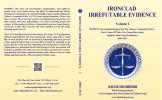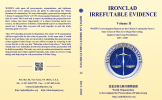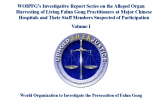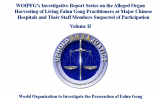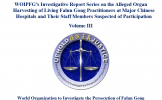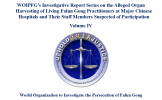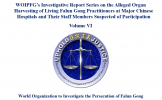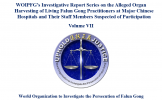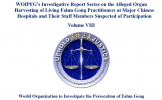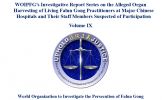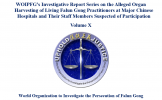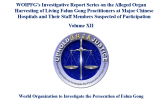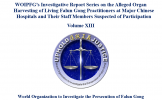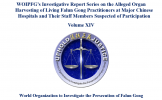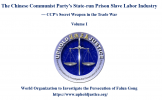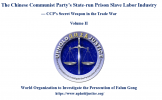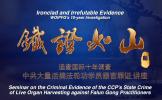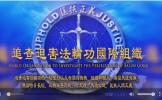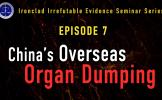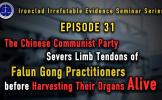Jiang Zemin's Crime of Genocide in the Persecution of Falun Gong
Overview
On July 20, 1999, Jiang Zemin (China’s head of state at the time) launched a large-scale of persecution of Falun Gong. By exploiting the state organizations, laws, policies, and the whole state apparatus, Jiang has committed crimes against millions of people who believe in truth, compassion, and tolerance—the principles of Falun Gong—both inside and outside China. According to Article 6 and Article 7 of the Rome Statute of the International Criminal Court published on July 17, 1998, by the United Nations, Jiang’s persecution of Falun Gong practitioners over the past five years has amounted to genocide and crimes against humanity. [1]
In the Rome Statute of the International Criminal Court, Article 6 states: “genocide” means any of the following acts committed with intent to destroy, in whole or in part, a national, ethnical, racial or religious group, as such: (a) Killing members of the group; (b) Causing serious bodily or mental harm to members of the group; (c) Deliberately inflicting on the group conditions of life calculated to bring about its physical destruction in whole or in part; (d) Imposing measures intended to prevent births within the group; (e) Forcibly transferring children of the group to another group.
Article 7 defines “crime against humanity” as any of the following acts when committed as part of a widespread or systematic attack directed against any civilian population, with knowledge of the attack: (a) Murder; (b) Extermination; (c) Enslavement; (d) Deportation or forcible transfer of population; (e) Imprisonment or other severe deprivation of physical liberty in violation of fundamental rules of international law; (f) Torture; (g) Rape, sexual slavery, enforced prostitution, forced pregnancy, enforced sterilization, or any other form of sexual violence of comparable gravity; (h) Persecution against any identifiable group or collectivity on political, racial, national, ethnic, cultural, religious, gender as defined in paragraph 3, or other grounds that are universally recognized as impermissible under international law, in connection with any act referred to in this paragraph or any crime within the jurisdiction of the Court; (i) Enforced disappearance of persons; (j) The crime of apartheid; (k) Other inhumane acts of a similar character intentionally causing great suffering, or serious injury to body or to mental or physical health.
For the past five years, Jiang Zemin has adopted the policy of “defaming their reputations, destroying them physically and financially” in order to eliminate Falun Gong practitioners. Such policy suits the first four categories of Article 6 (Genocide) and all categories except (j) of Article 7 (Crime against humanity).
The WOIPFG investigation of Jiang and his systematic plan to annihilate Falun Gong practitioners consists of the following ten parts. Some reports are published in this collection, and additional reports will be included in subsequent publications of this book.
· Part One: The persecution of Falun Gong is a deliberate crime of genocide based on Jiang’s personal will.
· Part Two: Jiang committed genocide against Falun Gong by systematically exploiting the state apparatus and power. (The “610 Office” system, the media, the judicial system, the public security and prosecution system, the departments of education and culture, the People’s Political Consultative Conference, the Communist Youth League, woman’s organizations, and the anti-cult associations have all in their own right participated in the persecution.)
· Part Three: Jiang committed genocide by torturing Falun Gong practitioners mentally (using psychiatric institutions, brainwashing centers, and mentally abusing Falun Gong practitioners’ families) in an attempt to extinguish their beliefs.
· Part Four: Jiang committed genocide by carrying out the policy of “destroying Falun Gong practitioners physically.”
· Part Five: Jiang committed the crimes of genocide and enslavement by inflicting forced labor, torture, and slavery on Falun Gong practitioners in labor camps.
· Part Six: Jiang committed genocide against Falun Gong practitioners in the form of rape, sexual abuse, forced abortion, and violence against children.
· Part Seven: Jiang has committed genocide by openly discriminating against and intimidating Falun Gong practitioners (deliberately inflicting on the group conditions of life calculated to bring about its physical destruction in whole or in part).
· Part Eight: Jiang has exported the persecution of Falun Gong beyond China’s borders through its oversea media, embassies and consulates, as well as some foreign governments and private companies.
· Part Nine: Jiang Zemin committed genocide as he practiced and achieved dictatorship. In the post-Jiang era, Jiang’s accomplices have penetrated top-ranking leaderships and key ministries, allowing the persecution to continue.
· Part Ten: The genocide of Falun Gong practitioners is in essence the destruction of humanity’s morality and conscience.
The persecution of Falun Gong is a deliberate crime of genocide based on Jiang’s personal will
Prior to July 20, 1999, when the large-scale persecution of Falun Gong practitioners began, Jiang had already used his power to make comprehensive, thorough preparations in the areas of ideology, media propaganda, organizational structure, and state law and policies, in an attempt to achieve the goal of completely wiping out Falun Gong practice groups. Various signs indicated that the large-scale persecution is entirely based on Jiang’s personal will. The execution of the persecution has violated China’s own Constitution as well as the Universal Declaration of Human Rights.
Background
On April 25, 1999, more than 10,000 practitioners went to Beijing to appeal at the State Council’s Appeal Office because a number of Falun Gong practitioners in Tianjin were detained without any reason and had their homes illegally searched. This became the well-known “April 25 Incident.” On the same day, representatives of Falun Gong practitioners met with the Premier at the time, Zhu Rongji, and other senior government officials. Zhu Rongji told the Tianjin government to release the practitioners immediately. Afterwards, all practitioners left the scene quietly without causing any disturbance. Although the Chinese government never publicly acknowledged or denied Zhu’s intervention in this matter, witnesses confirmed that they saw Premier Zhu greet the practitioners at the gate of the Appeal Office on April 25. The Appeal Office of the Central Committee and the State Council issued a summary of the main points of the conversation with the Falun Gong practitioners on June 14, 1999, just days before the persecution was officially implemented. This in fact proved that Zhu had peacefully handled Falun Gong practitioners’ mass appeal on April 25.[2]
1. Planning for the Persecution of Falun Gong
1) Ideology Planning: Differences in Belief Escalated to Issues of State Enemy
It is evident that Jiang became nervous upon witnessing the Falun Gong practitioners’ self-discipline, peacefulness, and coordination skills as displayed on April 25, 1999. He felt that his authority was challenged. At the same time, he was apparently unhappy about the fact that Zhu Rongji talked with representatives of the practitioners and easily handled the incident without his consent. This resentment was clearly reflected in the letter Jiang wrote to the members of the Politburo Standing Committee and other leaders on the night of the incident.[3]
In the letter, Jiang wrote, “Does it [Falun Gong] truly have overseas or western connections? Does it have ‘capable hands’ plotting and commanding behind the scene? It is a new warning signal that deserves our high degree attention. Sensitive time has arrived, and we must take proper measures immediately to prevent similar things from happening again.” In the letter,
Jiang also connected Falun Gong practitioners’ appeal with the pro-democracy movement in 1989, suggesting that the incident was a political movement. The letter stated, “This incident involved with the largest number of people in Beijing since the 1989 incident.” “How can the Marxism we communist party members represent, the materialism and atheism we believe not conquer what Falun Gong advocates? Otherwise, wouldn’t it be a big joke? It’s high time for our leaders at every level, particularly the senior ones, to be clear-minded.” In the letter, Jiang explicitly categorized the ideological difference in belief as issues of state enemy.
On June 7, 1999, Jiang spoke at a Politburo meeting, addressing the urgency of handling and solving the Falun Gong issue.4 He claimed that practitioners were “superstitious,” and interpreted the introduction of Falun Gong and its instant popularity as a “political battle between our party and the opposition forces at home and abroad to win over people and ideology territory.” He further stated, “This is not a simple issue. If we failed to see its political nature, cannot firmly, properly and quickly solve this problem, we are making a historical mistake.”
In his speech, Jiang also claimed that “more and more evidence proved that the ‘Falun Gong Issue’ is not a simply matter. We cannot underestimate it, nor can we take it lightly. If we failed to hurry up and solve the matter quickly, it will bring disasters to the society.” Although he could not produce any evidence to support his accusations, Jiang still alleged that “Falun Gong has deep-rooted political and social background and complicated international background as well.” “It is the worst matter since the 1989 incident.” He pledged “effective counter-measurement” in dealing with Falun Gong.[4]
2) Policy Planning
On April 27, 1999, the General Office of the Central Committee issued a notice [5], requesting all members of the Party Standing Committee to study and discuss Jiang’s letter and to research concrete measures for implementation.
On May 8, 1999, Jiang made the following comments 6, note to each and every senior member of the Central Politburo, the Central Secretariat, and the Central Military Committee, requesting “that the communist party members and officials take initiative to separate them from the Falun Gong group, and making this task a criterion for work unit inspection.” Jiang stated, “Falun Gong’s group activities shall be strictly reprimanded and ordered to stop. All levels of the Public Security and the National Security shall strengthen their intelligence gathering activities and pay particular attention to collecting and controlling information on new developments and trends, inside stories and directions, so [the Falun Gong issues] can be discovered, reported, controlled and dealt with in a timely manner. No practice sites, transportation, or publishing and communication facilities shall be provided.” He then asked each work unit to “guard your gate and control your people well.”
In his speech on June 7, 1999, Jiang ordered the members of the Communist Party and the Communist Youth League, cadres (both retired and at their posts) who practiced Falun Gong, along with their Party and league organizations and administrative leaders, to “immediately draw a clear line with Falun Gong, break away from its groups, and return to the party’s correct stand.” [4]
For those who refuse to give up their practice of Falun Gong, Jiang instructed to “carry out necessary organizational measures based on the related regulations. Each department, local government and the work unit shall firmly implement these measures.” “Shall maximally isolate and firmly attack those behind-the-scene and the key planners and organizers, showing no mercy at all.” It is evident that, besides persecuting Falun Gong’s founder and activity coordinators, Jiang from the very beginning has targeted Falun Gong practitioners as a group for suppression. Anyone who refuses to give up his belief is a target for attack. This was the beginning of the large-scale persecution encompassing the mental and physical torture of Falun Gong practitioners.
3) Organization Planning: Establishing the “610 Office”
In his speech on June 7, 1999, Jiang stated, “The central government has agreed to appoint Comrade Li Lanqing to lead and establish a leadership team specialized in handling the ‘Falun Gong’ issues. Li Lanqing will be the director of the team and Ding Guangeng and Luo Gan the deputy directors. Comrades in charge of the related departments will serve as team members. Together, the team will study the specific steps, means, and measures to solve ‘Falun Gong’ issues. The central government, ministries and commissions under state organs, governments of all provinces, autonomous regions and municipal cities shall closely cooperate.” [4] This indicated that starting from June 7, 1999, Jiang made organizational preparations to carry out an all-out crackdown on Falun Gong.
On June 10, 1999, under Jiang’s direct order, the Central Committee created the “Central Committee Leadership Team to Handle Falun Gong Issues” (“The Team”) with Li Lanqing as its director. Underneath the Team is the Central Committee “610 Office,” acting as its policy-making and executive body. The “610 Office” is headed by Luo Gan, secretary of the Central Political and Judiciary Committee, of which the “610 Office” is a standing body. The Team has widespread, absolute power over all levels of government judiciary systems and is the highest powerhouse in Jiang’s persecution of Falun Gong. Soon after, branches of the Team and its executive body “610 Office” were established locally one after another in provinces, cities, autonomous regions, and municipalities around the country. The Team consists of key members of the Party Committee at each level, and the “610 Office” is under the jurisdiction of the local Political and Judiciary Committee. In regard to handling the Falun Gong issues, the “610 Office” directly operates and tightly controls all levels of the Party and government offices, departments of public security, prosecution, courts, labor camps, national security, as well as propaganda organs and news media. It has actively carried out various persecutory campaigns according to Jiang’s intentions, instructions, and needs.
In its notice dated March 21, 2003 (GF 2003 No.8),[7] the State Council clearly stated that “The State Council Office to Prevent and Handle Cult Issues and The Central Committee Leadership Team to Handle Falun Gong Issues are one organization with two nameplates. Both of them are listed directly under the Central Committee.” This means that although the State Council has established the corresponding “610 Office,” it does not have authority over it. Furthermore, in the database of the regime’s mouthpiece, The People’s Daily website, names such as “The Office to Prevent and Handle Cult Issues” and “The Leadership Team to Handle Falun Gong Issues” are not listed under the directories of the departments directly under the Central Committee,[8] as well as the State Council and its ministries and commissions.[9] The fact that the “610 Office,” which has two official names externally and one internally, is not listed as a public body under the Central Committee or the State Council suggests that this is an illegal, secret organization. Based on its operating method, it is a superpower structure that reports to Jiang only and is above all existing constitutions and laws. It is similar to the “Central Committee Cultural Revolution Leadership Team,” which reported to Mao Zedong only.
4) Propaganda Planning
In his speech on June 7, 1999, Jiang also ordered to “collect” the so-called “victim cases,” including “mental illness, suicide, worsened health condition or even death as a result of refusing medication, etc.” from among Falun Gong practitioners around the country. At the end of the speech, Jiang asked to “organize specialists and scholars to conduct theoretical and historical studies of the social groups and social phenomena that used superstitions to deceive, swindle people for ulterior motives throughout history.” The “610 Office” has, through the so-called “Anti-Cult Association,” an NGO controlled by government officials and consisting of well-known specialists and scholars, published countless articles to slander Falun Gong and organized many anti-Falun Gong activities. It has also organized some hired hands under the name “specialist” or “scholar” to compile brainwashing materials, coaching labor camps and brainwashing classes to take advantage of people’s psychological weakness and forcibly conduct brainwashing. Jiang’s instructions were thus implemented.
As a matter of fact, in July 1999, shortly after the persecution started, accusations against Falun Gong’s founder and its practitioners such as the so-called 1,400 Falun Gong death cases, owning a luxury house, and accumulating wealth by unfair means, as reported by the state-run media, were completely in line with the propagandistic tone Jiang specified to the “610 Office” in his speech. This indicates that all “evidence” was fabricated by the “610 Office” based on Jiang Zemin’s personal will. In other words, Jiang’s abovementioned speech provided the guidelines of the nationwide propaganda campaign that followed for slandering Falun Gong. The existence of this speech can also be confirmed by reports of local governments studying the said speech.[10]
5) Personal Will
a. According to the Washington Post in a November 12, 1999, report, “The campaign has revealed dissent at the top echelons of power, undermining the image of China’s leadership as united and pragmatic. Communist Party sources said that the standing committee of the Politburo did not unanimously endorse the crackdown and that President Jiang Zemin alone decided that Falun Gong must be eliminated.” “It was Jiang who ordered that Falun Gong be labeled a ‘cult,’ and then demanded that a law be passed banning cults, a party source said. ‘This obviously is very personal for Jiang,’ said one party official. ‘He wants this organization crushed.’” [11]
b. On June 14, 1999, four days after the establishment of the “610 Office,” China’s major media printed the “summary of the main points of the conversation between the Appeal Office Officials and representatives of Falun Gong practitioners who came to appeal” (“Conversations from the Two Offices”),2 which denied the rumors of a crackdown on Falun Gong and once again affirmed the statement made to Falun Gong practitioners on April 25, that the “government has never banned any normal practice and health-improving activities; that people have the freedom to believe and practice certain kind of Qi Gong exercise, as well as the freedom not to believe in certain kind of Qi Gong exercise; that it is normal to have different views and options, and the difference can be reported through the normal channels and means.” This indicates two possibilities: either Jiang’s secret document had vetoed the Party and the government’s public policy (“Conversation from the Two Offices”), since Jiang was the only one who had the power to overrule the decisions of the Two Offices; or the “Conversation” itself was part of the conspiracy, since based on the Party’s pattern in all previous political campaigns, prior to launching an official, large-scale attack on certain targeted groups of people, the government had always adopted the strategy of lulling the masses through its propaganda. Nevertheless, either possibility shows that Jiang masterminded the entire scheme. Further indirect evidence reveals that, before the persecution of Falun Gong began (prior to July 20, 1999), all documents related to the persecution were issued according to Jiang’s personal speeches and letters. None of the other members of the Standing Committee of the Politburo had issued any statement on this subject.
c. On April 27, 1999, the General Office of the Central Committee issued a “Notice on Publishing and Circulating ‘Comrade Jiang Zemin’s Letter to the Standing Committee of the Politburo and Other Leaders Concerned.’”[5] The notice required that Jiang’s letter, which was written on the night of April 25, 1999, be studied and implemented, and the status be reported to the Central Committee. This notice revealed that it was Jiang himself who evaluated the April 25 incident negatively. Jiang’s letter, along with the notice, showed that Jiang wanted to force his personal will upon the top-ranking officials in the Party. The notice required the study and implementation of Jiang’s letter, instead of discussion or the soliciting of opinions.
d. From a hierarchical point of view, what Jiang raised in his speech on June 7, 1999—that “the central committee, ministries and commissions under state organs, governments of all provinces, autonomous regions and municipal cities shall closely cooperate with the 610 office”—has bestowed super power on the “610 Office,” placing it over existing Party and government offices. Now that the central committee, which means the Party’s Central Committee, ministries and commissions under state organs (i.e., government offices) can only, and shall, “cooperate,” the “610 Office” is answerable to Jiang and Jiang only. Therefore, the “610 Office” is Jiang’s personal commanding system and tool.
On a broader spectrum, since July 19, 1999, the Central Committee,[12] the Ministry of Public Security[13] [14]the Ministry of Civil Affairs [15] [16] the Central Organization Department,[17] the Central Propaganda Department,[18] the Central Personnel Department,[19] the Communist Youth League,[20] the General Administration of Press and Publication,[21] the General Political Department of the People’s Liberation Army,[22] the Association of Industry and Commerce,[23] the Democratic Parties,[24] the Ministry of Culture,[25] and the Ministry of Education,[26] etc., have all pledged their allegiances by means of notice, statement from the person in charge, and other forms to Jiang’s decision to ban Falun Gong.[5] They have also asked their subordinate units at both the provincial and municipal levels to study, understand, implement, and execute the directives in Jiang’s speech. Under the circumstance that the crackdown on Falun Gong had no legal basis, only Jiang could have such super power in the Party, the government, and the army to decide to crack down on Falun Gong.
e. Once again, Jiang was first to publicly label Falun Gong an “evil cult.” On October 25, 1999, Jiang declared for the first time that “Falun Gong is an evil cult” when he was interviewed by the French newspaper Le Figaro.[27] One day later, all major newspaper in China printed Jiang’s statement as front-page headline news, with a title “Falun Gong Is An Evil Cult.” On October 27, 1999, the Xinhua News Agency reprinted a special editorial from the People’s Daily.[28] The editorial repeatedly quoted the lies about Falun Gong that appeared in an article published in the July 22 edition of the People’s Daily[29] to prove that Jiang was “speaking on solid grounds.”
f. Based on the many eyewitness accounts posted on Minghui Net (a website by Falun Gong practitioners), it is evident that when practitioners challenged the illegal conduct of local law enforcement, the immediate replies were oftentimes identical, “Go reason with Jiang Zemin. It’s Jiang Zemin who ordered us to do so.” When confronted by Falun Gong practitioners, “610 Office” personnel said, “We have no choice. Because Jiang Zemin feeds me [meaning Jiang pays his salary].” When practitioners asked for receipts upon paying fines,27 they were also told to “go talk to Jiang Zemin.” Canadian practitioner Wang Yuzhi was detained and tortured many times when she was in China. She wrote in her testimony, “When the head of the detention center could get nothing from me, he said: ‘then I have to follow Jiang Zemin’s order. Falun Gong is an evil cult. You are all cult members. If you were tortured to death, your family members can lodge a complaint with Jiang Zemin.’” [30]
6) Legal Planning
On October 30, 1999, five days after Jiang’s interview with Le Figaro, the Standing Committee of the People’s Congress passed a resolution,[31] “The Resolution on Banning Evil Cult Organizations, Preventing and Punishing Evil Cult Activities.” From this evidence, it is obvious that
Jiang delivered his speech, in which he declared Falun Gong an evil cult, before the law was passed by the People’s Congress.
In fact, Article 300 of the new Criminal Law[32] established in the late 1980s does not give a definition of evil cult. Nor does it provide any by-laws. In order to legalize the persecution, Jiang used the People’s Congress to amend the law. On December 31, 1999, the People’s Congress passed the by-laws of Article 300 of the Criminal Law, which give six definitions of evil cult. However, Falun Gong was not mentioned even once in the by-laws. Furthermore, the state has never, through any legal procedure, attested whether Falun Gong fits any of the definitions established in the by-laws. In view of this, the abovementioned resolution is part of Jiang’s conspiracy to persecute Falun Gong on a large scale. It’s purpose was to seek and create a “legal basis.”
2. Violating China’s Constitution, Amending the Laws to Legalize the Genocide of Falun Gong Practitioners
1) Violating China’s Constitution
From the onset of the persecution, during the process by which it was carried out under Jiang’s direction and orders, the following articles of China’s Constitution were violated[33]: Article 35 on freedom of speech, freedom of assembly, etc.; Article 36 on freedom of religious belief; Article 37 on freedom of person; Article 38 on individual dignity; Article 39 on family; Article 40 on communications; Article 41 (freedom of speech); Article 53 on abiding by the constitution; and Article 54 on safeguarding state interests.
In July 1999, Jiang declared, through the Ministry of Civil Affairs, that Falun Gong was an illegal organization.[14] In reality, the Ministry of Civil Affairs does not bear such authority. Yet, this administrative order was served as the “legal” basis to crack down on Falun Gong on a large scale.
In the same month, Jiang single-handedly launched the large-scale persecution of Falun Gong and Falun Gong practitioners in Mainland China. On July 19, the Central Committee issued a notice banning all Party members from practicing Falun Gong.12 The notice required that “the party shall unanimously carry out” the following three steps: “study for improvement,” “education for transforming,” and “organization discipline.” It further required that the directives be “implemented to all basic levels of the Party organization and all Party members, leaving no corner untouched,” and to “carry out the mass work conscientiously.”
On July 20, sweeping police action took place throughout Mainland China. Falun Gong assistants nationwide were arrested and their homes ransacked. On the same day, upon learning what had happened, thousands of Falun Gong practitioners rushed to the State Council’s Appeal Office. They were arrested and taken to the Beijing Fengtai Stadium, Shijingshan District Stadium, and other large stadiums where they were detained.
On July 22, the crackdown on Falun Gong officially began. The People’s Daily carried a long article, “On Li Hongzhi,” to criticize Mr. Li, the founder of Falun Gong. The Ministry of Civil Affairs issues a public notice, “Resolution on Banning Falun Dafa Research Association.”15 The Ministry of Public Security issued “Six Prohibitions,” stating that “hanging or posting banners, pictures, badges and other signs of Falun Dafa (Falun Gong) in any place is prohibited; distributing Falun Gong publications, audio and video products, and any other propaganda material in any place is prohibited; gathering together to ‘do Falun Gong exercises,’, ‘spread Falun Gong’ and other activities in any place is prohibited; organizing gatherings, parades, demonstrations in the forms of sitting-in and appealing to uphold and advocate Falun Gong is prohibited; inciting, disturbing social orders by means of fabricating or distorting the facts, deliberately spreading rumors and any other forms is prohibited; organizing, networking, directing activities against certain government decisions is prohibited.”[14]
Local police authority continued to detain and arrest Falun Gong practitioners, forcibly took them to the public stations to watch TV propagandas that slandered Falun Gong. They ransacked practitioners’ homes, confiscated and burned Falun Gong books, literature, and audio and video materials. Meanwhile, hundreds of thousands of practitioners began peacefully appeals to the Beijing and local governments. They were dispersed, beaten, detained, and arrested, and their basic rights guaranteed by the Constitution were grossly violated.[34]
Soon after, the Central Propaganda Department, the Personnel Department, the Communist Youth League, the General Administration of Press and Publication, the General Political Department of the People’s Liberation Army, the Association of Industry and Commerce, the Democracy Parties, the Ministry of Culture, and the Ministry of Education, and others, all pledged their allegiance by issuing notices or resolutions regarding Jiang’s decision to ban Falun Gong. These organizations also asked their provincial and municipal subordinate units to implement and execute the directives Jiang put forth in his speech.[18] - [26]
The fact is, when the Ministry of Civil Affairs, which is responsible for organization and group registration, banned the “Falun Dafa Research Association,” the Association had already been defunct. The Falun Dafa Research Association was originally a branch of the Chinese Qigong Scientific Research Society (the “Society”) and had since been dissolved after it withdrew from the Society in 1996. Moreover, the basis of the notice from the Ministry of Public Security was “guilty of ideology”: anyone or anything that had any connection with Falun Gong was prohibited. Such prohibition is an open violation of the Constitution.
2) Taking the Ultra Vires Explanation of the Law as Legal Basis for the Persecution
On October 8 and 9, 1999, Jiang used the Procurator-Committee of the Supreme People's Procuratorate and the Trial Committee of the Supreme People's Court to pass a judicial explanation.[35] This was “The Supreme People’s Court and the Supreme People’s Procuratorate’s Explanations on Specific Law Applications in Handling Cases of Organizing and Using Cult Organizations to Commit Crimes.” (the “Explanation”)
The Explanation is essentially the Supreme Court and the Supreme Procuratorate’s judicial explanation of Article 300 of the Criminal Law. Both the Supreme Court and the Supreme Procuratorate have exceeded the boundaries of judicial explanation in the Explanation and, in reality, have exercised the legislative explanation power and even the legislation power of the standing committee of the People’s Congress. This apparently has constituted an ultra vires act.
Furthermore, the Explanation did not give “cult organization” a specific, case-supported definition. In fact, the Explanation provides a legal cover for Jiang to carry out the genocide of Falun Gong groups.
In order to legitimize the Explanation, on October 30, 1999, Jiang once again used the 12th Session of the Standing Committee of the Ninth National People’s Congress to pass a regulation,[31] “The Standing Committee of the National People’s Congress Resolution on Banning Evil Cult Organization and Preventing and Punishing Cult Activities.” The Washington Post in its November 2, 1999, editorial, “China’s Rule of Law,”[36] stated that, “When they found themselves without the laws they needed to vigorously persecute a peaceful meditation society, the Party simply ordered up some new laws. Now these will be applied—retroactively, of course—in show trials that could lead to execution for the group’s leaders.” Jiang used the People’s Congress, which served merely as a rubberstamp, to order up these “laws.” In doing so, Jiang once again acted in excess of the president’s authority bestowed by the Chinese Constitution. Furthermore, it is illegal to retroactively apply such laws in order to prosecute and sentence Falun Gong practitioners.
To escalate the persecution, Jiang again used the Supreme People’s Court and the Supreme People’s Procuratorate to amend the Explanation and publish a second explanation on June 4, 2001,37 The Supreme People’s Court and the Supreme People’s Procuratorate’s Explanations on Specific Law Applications in Handling Cases of Organizing and Using Cult Organizations to Commit Crimes II.” (“The Explanation II”) This explanation quantified the amount of Falun Gong materials considered illegal in judging the cases. For flyers, pictures, banners, and newspapers, the number is 300 and above; for books and periodicals, 100 and over; for CDs, VCDs, and DVDs, 100 and over; for audio and videotapes, 100 and over (Article 1). It also specified detail actions that considered criminal: producing and/or distributing DVDs, VCDs, and CDs that advocate Falun Gong (Article 2); using the Internet (Article 3); hanging banners and scrolls, or writing and/or spraying Falun Gong slogans in public places (Article 4). By providing these details, Explanation II is in essence a cover-up of its open violation of the Chinese Constitution.
According to the explicit provisions of China’s Criminal Law, only “crimes of producing, duplicating, publishing, selling, and/or distributing pornographic materials for profit,” “crimes of publishing works discriminating, insulting minority ethic groups,” and few others are defined as crimes associated with publishing, printing, duplicating, and distributing publications. There is no statute on publishing, printing, duplicating, and distributing any other kind of publication that would constitute criminal activity. For the Supreme People’s Court and the Supreme People’s Procuratorate to declare in the Explanation that “publishing, printing, duplicating, distributing publications, and printing the organization’s logo” is a crime is a typical example of guilty because of ideology and expression. The Explanation also unilaterally put the abovementioned actions in the same category as “undermining the enforcement of the law of the state and the administrative law and regulation.” Consequently, innocent actions are “stipulated” as crimes.
The following case[38] will illustrate the points. On December 31, 2001, four female Falun Gong practitioners in Beijing were abducted by the police while they were producing materials that explained the truth. After they were illegally detained for nearly 10 months, Beijing’s First Intermediate Court sentenced these four practitioners to heavy prison terms on September 5, 2002. Jiang Changfeng was sentenced to ten years in prison and deprival of political rights for three years; both Jing Xiouyun and Yuan Lin were sentenced to eight years in prison and deprival of political rights for two years; Qiu Fengyuan was sentenced to seven years in prison and deprival of political rights for two years. The court handed out the illegal sentences on September 5 but did not notify the practitioners’ families until September 25. They even threatened the families, saying that they had no rights to appeal. The location where the four practitioners are serving their sentences is unknown.
Most of the Falun Gong practitioners who were arrested for distributing Falun Gong materials were charged with “undermining the law enforcement.” On August 17, 2001, Beijing’s Dongcheng District Court sentenced 25 Falun Gong practitioners to prison terms of up to ten years for unfurling a 100-meter-long banner that said “Falun Dafa is Great” in Tiananmen Square in 1999. An official at the Dongcheng Judicial Bureau said, “The court has to implement the policy the government had set up already.” An official at Beijing’s First Intermediate Court emphasized during an interview that the secret sentencing on September 5, 2002, was based on the People’s Congress’s secret regulation. After the appeal was rejected on September 27, 2001, the Court changed the case number from 1458 to 1473 to close the case.[39]
3) Ordering and Encouraging the Continuous Blocking of Falun Gong Practitioners’ Normal Appeal Channels Guaranteed by the Constitution
Jiang ordered and encouraged the continuous blocking of Falun Gong practitioners’ normal appeal channel guaranteed by the Constitution, as well as other formal and informal channels for citizens to rationally express their wishes. He ordered and encouraged the court to deprive Falun Gong practitioners’ of time and right to prepare a defense, and to dodge the proper legal procedures. Trials that are supposed to be conducted openly, as required by law, were held behind closed doors; seemingly false material was taken as legal “evidence”; legal procedures were neglected, conviction and sentencing were predetermined prior to the trial; indictments were not served; rights to interviewing witnesses were deprived; and rights to all appeals were denied. The mother of tCanadian practitioner Yuan Biao was secretly tried and sentenced this way.[40]
To prevent local Falun Gong practitioners from going to Beijing to appeal, Jiang dispatched the public security departments of the railway, airline, and other transportation systems to rigorously monitor all major train stations and ports, and arrest Falun Gong practitioners on sight. For example, on June 19, 1999, more than a thousand Falun Gong practitioners departed from Benxi, Liaoning, to go to Beijing to appeal. Benxi police set up blockades everywhere in an attempt to stop these practitioners from reaching Beijing, causing Train No. 28 from Liaoning to Beijing to be delayed at Shenyang Station for more than an hour. Despite police’s carpet search, more than 500 Falun Gong practitioners broke through the blockade and arrived in Beijing on June 19, 1999. They held a group appeal at the State Council’s Appeal Office. The appeal shocked the Central Committee and was named the “6.19 Incident.” [41]
On July 20, 1999, a nationwide large-scale action to arrest Falun Gong assistants and ransack their homes took place. Upon hearing this news, tens of thousands of Falun Gong practitioners went to the Appeal Office in Beijing. They were arrested and detained at the Beiing Fengtai Stadium, Beijing Shijingshan Stadium, and other big stadiums. In other locations, Falun Gong practitioners who went to their local government to appeal were all arrested as well.[41]
In regard to the judicial systems, Jiang deprived Falun Gong practitioners rights to defense attorneys and rights to research laws and gain legal knowledge. Falun Gong practitioners who know the laws and their constitutional rights were subject to still more brutal torture and abuse. In a typical case, two independent defense attorneys were forbidden to defend practitioner Li Jianhui as not guilty. This took place in January 2000 in Shenzhen, Guangdong.[42] In September 2002, without notifying his family and without providing any defense counsel or legal process, the Ganjingzi District Court in Dalian City sentenced Liu Hongbo to 10 years in prison.[43] Liu Hongbo requested to appeal against the verdict. Similarly, without notifying his family and with no defense counsel or legal proceedings, Dalian’s Intermediate Court upheld the original verdict. Liu was later sent back to the Yaojia Detention Center in Dalian.
3. Illegal Arrest Warrant on Falun Gong’s Founder
In an attempt to wipe out the Falun Gong group, Jiang launched a series of persecutory campaigns against the founder of Falun Gong. In his speech on June 7, 1999, Jiang ordered the news media to attack Mr. Li Hongzhi, founder of Falun Gong, and dig up evidence of so-called “evil doings and overseas background” and “put together a report that’s well-grounded on facts.” [4]
On July 30, 1999, an arrest warrant (Warrant No. 19990102)[13] for Mr. Li was sent to the public security department and bureau in every province, autonomous region, and municipality. In the meantime, an international arrest warrant was issued to Interpol but was rejected by its member countries. Soon after, Mr. Li’s passport was revoked, making it impossible for him to travel outside of the United States. Jiang’s determination to eliminate Li Hongzhi and Falun Gong was obvious.
4. Ordering the Ban on Publishing Falun Gong Literature, and Confiscating and Destroying Books and Material
Throughout Chinese history, restricting people’s freedom to access knowledge and ideas has always been the means adopted by the central authority as a way to control people’s minds. Thousands of years ago, a number of feudalist emperors burned books and buried the scholars in pits. Jiang adopted the same approach in an attempt to unify people’s minds by using the boundaries he delimited. Since the persecution of Falun Gong is completely based on lies fabricated by the regime, Jiang has to destroy all Falun Gong literature so that people could not verify for themselves that the propaganda denigrating the practice was fictitious.
After July 20, 1999, Jiang and the “610 Office” branches across the country issued orders to confiscate and destroy Falun Gong books and material. In its note on July 22, 1999, the Ministry of Public Security stated that hanging or posting banners, posters, badges or other logos that advocate Falun Dafa (Falun Gong) was prohibited. Also prohibited were the distribution of books and periodicals, video and audiotapes, and other materials promoting Falun Gong.
Under the central government’s order, local governments began full force to destroy Falun Gong publications and other associated materials. In many provinces and cities, people were called to gather together and pledge their separation from Falun Gong and to destroy Falun Gong publications.
As a part of the nationwide anti-Falun Gong campaign, which began on July 20th, 1999, hundreds of thousands of Falun Gong books, video and audiotapes, and other related material were confiscated, burned, and destroyed.
Although it is hard to estimate how many Falun Gong books were confiscated and destroyed in total, clues can be found from the frequent reports in the Chinese official newspapers. These reports enthusiastically publicized “victories” against Falun Gong and oftentimes listed the number of books destroyed.
The People’s Daily reported on July 29, 1999,[44] “On the afternoon of July 28, the first nationwide action to destroy Falun Gong publications and propaganda material was held simultaneously in Beijing, Tianjin, Jiangsu, Jilin and Hubei provinces.” “It is reported that at this news hour, more than 1,550,000 copies of Falun Gong publications have been confiscated. Large-scale destruction of these publications is scheduled for July 29 in Guangdong, Shandong, Hubei, Shanghai, Liaoning, Sichuan and Shanxi provinces. The photograph below shows workers throwing Falun Gong publications into the pulping machine ……”
CNN on July 29, 1999,[45] and the China Daily on July 30, 1999,[46] both reported, “It is reported by the Xinmin Evening News that during a campaign ceremony in Shanghai, which was hosted by Jin Binghua, the head of the Propaganda Department, 45,000 copies of [Falun Gong] books were thrown into the pulping machine.”
“Up to August 2, 1999, 7,359 copies of Falun Gong books and 2,132 audio and video products have been confiscated in the city of Shantou.” “On July 27, 1999, authority in Xiangtan city searched 289 bookstores, street vendors, audio and video stores, and copy centers, and confiscated over 40,000 copies of Falun Gong books and 1,000 audio and video products.”
“In Shanghai, between 40,000 to 50,000 copies of [Falun Gong] books have been destroyed; In Yunnan province, 3,367 copies of books were destroyed [on July 30, 1999].”
Within three months, as reported by the AFP on October 21st, 1999,[47] “Chinese authorities have arrested nine key members of Falun Gong and confiscated millions of banned books and video tapes in a fresh crackdown on the spiritual group, state radio and television reported October 21. A total of 7.8 million books and 4.9 million videotapes were confiscated in the Chinese cities of Wuhan and Jinan.”
In addition, copy centers were under surveillance, warehouses were thoroughly searched, and private bookstores were shut down. The Xinhua News Agency reported on July 27, 1999,[48] “On July 24, the economic investigation team from the Industry and Commerce Bureau of Urumuqi, Xinjiang searched the bookstores and private bookstands throughout the city in an attempt to stop the sales of illegal CDs and Falun Gong books.”
 |
 |
 |
It was a common occurrence for people who published and sold Falun Gong books and publications to be thrown in jail. As reported by the AP on November 25, 1999,[49] four Falun Gong practitioners were prosecuted for illegally printing 50,000 copies of Falun Gong books. They were arrested in August. Once convicted, they could face up to 7 years in prison. One trial was about Li Xiaomei and Li Xiaobin, who were sisters running a bookstore. They were arrested for selling Falun Gong books, audio and videotapes, and other Falun Gong related products. The AFP reported on February 1, 2000 [50] that the sisters were respectively given 6 years and 7 years in jail.
At the same time, Falun Gong practitioners around the country were ordered or threatened to hand in their Falun Gong books. The following experience of a practitioner from Guangzhou, Guangdong, is a typical example[51]:
“My husband has also endured similar unfair treatments. The head of his department asked him to hand in the book Zhuan Falun, and said that the authority wanted it. He threatened to fire my husband if the book was not handed in. My husband is an obedient person and thought that they wanted the book just for inspection. He told them, ‘this book is more precious than my life. Please take care of the book. Give it back to me in a few days.’ A few days later, when my husband approached the division head for the book, he was told that the book had been turned over and burned.”
 |
 |
 |
In order to carry out the policy of confiscating Falun Gong books, police and government staff had to search practitioners’ homes and confiscate their books by force, openly violating the law. A practitioner in Zhangzhou City said that officials from Nanjing’s Jingcheng police station “forcefully confiscated Wu Simei’s books, claiming it’s by government order. They did not show any official documents or warranty, nor did they follow any legal procedure during the process.”[52]
5. Directly Slandering Falun Gong with Fabricated Lies
During an interview with the French newspaper Le Figaro on October 25, 1999, Jiang called Falun Gong “an evil cult.” During the Asia-Pacific Economic Cooperation summit in Aukland, New Zealand, in September 1999, Jiang personally handed out a book attacking Falun Gong to many of the participants at the meeting, including President Clinton and other world leaders. The book, Li Hongzhi & His “Falun Gong”: Deceiving the Public and Ruining Lives,[53] was published by China’s Central Propaganda Bureau and contained nothing but fraudulent lies vilifying Falun Gong in every conceivable fashion. Jiang’s move stunned diplomats. The World Journal, a New York-based Chinese language newspaper, made the following comment on
Jiang’s folly: “Jiang made a fool of himself when he gave propaganda material with bloody contents as a gift to President Clinton.” [54]
In an interview on the U.S. TV network CBS in September 2000, Jiang continued his fabrications for the purpose of slandering Falun Gong: “Li Hongzhi claimed that he was reincarnated Bodhisattva and reincarnated Jesus Christ. He claimed that the end of the world would soon arrive and the earth would soon explode. After much deliberation, we decided to brand Falun Gong as an evil cult.” However, one cannot find any of these words in any Falun Gong books.[55]
6. Directly Giving Secret Orders to Carry Out the Policy of Genocide Against the Falun Gong Group
Over the years, through the “610 Office,” Jiang Zemin has continuously given out a string of secret orders against Falun Gong. From “eradicating Falun Gong within three months” to “defaming their reputations and destroying them financially and physically”; from “counting a beaten-to-death case as suicide” to “directly cremating the body without checking the identity,” these orders have directly caused a sharp increase in the death toll of Falun Gong practitioners while in police custody. As of June 10, 2004, it has been verified that 977 Falun Gong practitioners have been tortured to death, while the actual number of death cases has far exceeded this number. According to the Chinese government’s internal statistics, the actual number of practitioners who died after being arrested had reached 1,600 by the end of 2001.[56]
The Minghui Net website reported on July 4th, 2003, that[57] in a new round of persecution of Falun Gong, the authorities in Zhoukou City, Henan Province, were told to cooperate. It was reported that the officials received the order via telex from the top and were instructed to “destroy the document after reading.” The order was then passed down the chain of command verbally and was carried out directly. When it reached the grass-root level, the order became, “We had been busy dealing with SARS so we did not have time [to deal with Falun Gong]. Now we should free up our time and seriously handle the Falun Gong issues.” “It is unusual times, and we do not need to follow any laws in dealing with Falun Gong.”
1) “Eradicate Falun Gong within three months”
Taipei’s China Times reported on September 1, 2000,[58] “The Chinese Communist Party has decided to escalate its oppression on Falun Gong and plans to eradicate Falun Gong within three months. Sources indicate that Falun Gong practitioners in New York are planning to have a large demonstration of over 1,000 people during the United Nation’s millennium meeting in New York, which the Secretary of the Chinese Communist Party Jiang Zemin is expected to attend. They also plan to publish and deliver a letter to urge Beijing to stop the genocide against Falun Gong practitioners.”
The article quoted the New York-based Falun Dafa Information Center, “Reliable sources in China have disclosed plans issued by Chinese Communist head, Jiang Zemin, to mount a new attempt to wipe out Falun Gong within three months. The new plan is called ‘Destroying the reputation of Falun Gong completely, exhausting Falun Gong practitioners financially, and eradicating Falun Gong within three months.’”
The article further reported that on August 28, 2000, the Chinese Ministry of Public Security held a nationwide telephone conference to relay new orders from Jiang. Its key point: “further intensify the crackdown on Falun Gong.” The plan recommended that some practitioners considered “backbone figures” be “heavily punished.” The authorities also reportedly discussed executing certain practitioners who have remained faithful to their beliefs. The purpose of such a move is apparently to threaten a large number by killing a few.
2) “Defaming Falun Gong practitioners’ reputation, destroying them financially and physically”
Sources from within Chinese law enforcement agencies and members of the Chinese People’s Congress revealed that at the beginning of the persecution, Jiang Zemin had a secret meeting with Luo Gan on the Falun Gong issues.[59] The key points of the meeting are as follows:
1. Show no mercy to Falun Gong practitioners, especially those who appealed or distributed truth-clarification materials. Beat them at the point of arrest and beat them hard. If they are beaten to death, count them as suicides. Cremate their bodies directly without checking their identity.
2. In regards to the [Falun Gong] issues, we shall use all possible means to eradicate Falun Gong without being constrained by anything, including the laws. No accountability for the death of any Falun Gong practitioner. I don’t believe that I cannot eradicate Falun Gong.
3. Defame Falun Gong practitioners’ reputation, destroy them financially and physically.
4. Under normal condition, no classified documents will be issued. Orders will be given either verbally or through encrypted telex with no undersigning names. In general, simply say it is the “Central Committee’s instruction,” and it should be sufficient.
According to a September 2001 report on Minghui Net, a source from the Mainland Law and Judicial system exposed that the “610 Office” controlled by Luo Gan sent out a secret order stating that practitioners who refused to accept brainwashing will be subject to “life in prison.” The content of the confidential document is summarized as follows: “[when] a practitioner is identified, [the police] can secretly arrest him/her, and detain him/her life in prison till his/her death. If a policeman found a Falun Gong practitioner but did not take action to arrest him/her, the policeman will be fired and his/her registered permanent residency will be cancelled.” The document was created when some information indicated that due to the great amount of world attention and concern [about the persecution of Falun Gong in China], the government was going to release detained Falun Gong practitioners without any condition. The “610 Office,” which was set up specifically to persecute Falun Gong and controlled by the secretary of CCP Political and Judiciary Committee Luo Gan, secretly sent out the document to all levels of the Law and Judicial system.[60] Without instruction from the highest authority, neither Luo Gan nor the “610 Office” is able to take such action beyond their power to interfere with the Law and Judicial system’s order of “releasing detained practitioners (especially the practitioners still being held with matured terms).
During 2000, Luo Gan traveled around the country to verbally transmit Jiang Zemin’s secret orders: Defame Falun Gong practitioners’ reputation; destroy them financially and physically; count it as suicide if a practitioner is beaten to death; cremate the body on the spot without checking the identity. Upon completing the mission, Luo Gan returned to Beijing.
The orders were carried out. Take the Wangcun Labor Camp in Shandong Province, for example.[61] Under Luo Gan’s direct command, the labor camp forced Falun Gong practitioners to attend brainwashing sessions, deprived them of sleep for days at a time, forced them to watch videotapes that slandered Falun Gong and write reports on their thoughts, and savagely tortured them both physically and mentally. Zheng Wanxin, the captain of the 9th Squadron of the labor camp, and his staff hung up Falun Gong practitioners, shocked them with more than 10 electric batons at the same time, and forcibly fed practitioners.
3) Kill without mercy. Shoot Falun Gong practitioners at sight.
According to Falun Dafa Information Center’s report on March 4, 2002,[62] “Sources revealed that one of the leaders of the national ‘610 Office,’ Liu Jing, held a meeting regarding the persecution of Falun Gong shortly before the Chinese New Year. During the meeting, Liu Jing angrily criticized Jilin Province’s lack of effectiveness in the persecution and gave a strict order to ‘completely eliminate’ Falun Gong. This meeting was where the infamous ‘shoot to kill’ order was given.”
Between February and March of 2002, the Public Security Bureau in Changchun, Jilin, received an order that they may shoot to kill Falun Gong practitioners if they see practitioners hanging banners with truth-clarification messages or distributing materials containing the facts about Falun Gong. Shortly afterwards, the Public Security Bureau in Liaoning Province and Shandong Province received the same secret order. In several large cities in northeastern China, the police kept shooting Falun Gong practitioners at sight during this period of time. On February 26, 2002, the police force in Anshan City, Liaoning Province, shot a Falun Gong practitioner while they were in pursuit of three Falun Gong practitioners. A policeman shot four bullets in a row and wounded a Falun Gong practitioner in the thigh. According to Falun Dafa Information Center’s report on March 4th, 2002, at least three shooting incidents took place and one Falun Gong practitioner’s thighbone was fractured as a result of the shooting. Du Yongshan, a policeman in Mishan City, Heilongjiang Province, shot a Falun Gong practitioner, Jiang Honglu, in public and broken one of his legs.[63]
Chang Xiaoping is the First Undersecretary of Changchun’s Party Committee who oversees the city’s “610 Office.”[64] In the early morning of March 12, 2002, Falun Gong practitioner Liu Haibo, alleged to have provided lodgings for practitioners involved in the TV broadcast, died as a result of the forced interrogation and torture by the criminal police unit of the Kuancheng Public Security Division. Chang Xiaoping rushed to the Kuancheng Division and issued the following instructions on how to handle the incident:
1It is an arduous task to handle Falun Gong issues. Therefore, injury and death are not to be worried [about].
2 Carefully cover the death of Liu Haibo to prevent it from leaking and causing international pressure.
Commission for Inspecting Discipline at different levels shall not get involved and investigate the injury and death of Falun Gong practitioners. Take the whole situation into account.65
This is essentially an order to kill without mercy. Considering the highly centralized power system of the Chinese Communist regime, such an order can only come from the very top.
References
[1] The Rome Statute of International Criminal Court http://www.un.org/law/icc/index.html(Back)
[2] People's Daily, June 15, 1999. The Appeal Office of the Central Committee and the State Council issued a summary of main points of the conversation with the Falun Gong practitioners on June 14, 1999.(Back)
[3] “Letter from comrade Jiang Zemin to Politburo members and other concerned leaders,” April 25, 1999.(Back)
[4] “Directive from Comrade Jiang Zemin at the Chinese Central Politburo Meeting regarding an urgent and fast way to solve the Falun Gong problem,” June 7, 1999.(Back)
[5] The General Office of the Central Committee issued a notice on April 27, 1999, regarding the printing and distribution of “Letter from comrade Jiang Zemin to Politburo members and other concerned leaders”(Back)
[6] The General Office of the Central Committee issued a notice in May 1999, regarding “comrade Jiang Zemin made the comments to each and every senior member of the Central Politburo, the Central Secretariat, and the Central Military Committee.”(Back)
[7] The State Council issued a notice (GF 2003 No.8) regarding the issue of organization establishment(Back)
[8] Directories of the departments directly under the CCP Central Committee(Back)
[9] The name list for the heads of the State Council and its ministries and commissions (Back)
[10] Fujian Economic Management Institute Events (1999.1-1999.12), on July 26, 1999 all Party members of the institute came to the meeting to listen “The Notice from the General Office of the Central Committee regarding the printing and distribution of "Directive from Comrade Jiang Zemin at the Chinese Central Politburo Meeting regarding an urgent and fast way to solve the Falun Gong problem” (ZBF 1999 No. 30)(Back)
[11] Washington Post November 11, 1999, “Cracks in China's Falun Gong Crackdown” by John Pomfret(Back)
[12] On July 19, 1999, the Central Committee issued a notice stating Party members are not allowed to practice Falun Gong(Back)
[13] On July 30, 1999, the Ministry of Public Security issued an arrest warrant (Warrant No. 19990102) for Falun Gong founder Mr. Li Hongzhi.(Back)
[14] On July 22, 1999, the Ministry of Public Security stated that hanging, posting banners, posters, badges or other logos that advocate Falun Dafa (Falun Gong) was prohibited(Back)
[15] The Ministry of Civil Affairs’ Decision to Ban Falun Dafa Research Association (July 22, 1999)(Back)
[16] On July 24, 1999, a spokesman for the Ministry of Civil Affairs said banning Falun Dafa Research Association was a decision made according to law.(Back)
[17] People’s Daily Report on July 23, 1999, firmly execute Central Committee’s decision, observe the national law – the head of the Central Organization Department makes the statement to the reporter.(Back)
[18] People’s Daily Report on July 24, 1999, Practically take the political liability, grasp the correct guidance of public opinion, the head of the Central Propaganda Department makes the statement to the reporter.(Back)
[19] On July 24, 1999, the Central Personnel Department issued a notice stating government workers are not allowed to practice "Falun Dafa"(Back)
[20] On July 24, 1999, the Communist Youth League issued a notice stating members of the Youth League are not allowed to practice “Falun Dafa.”(Back)
[21] On July 27, 1999, the General Administration of Press and Publication issued an urgent notice asking to collectively clean up “Falun Gong” publications.(Back)
[22] People’s Daily Report on July 28, 1999, the General Political Department of the People’s Liberation Army issue a comment that requests the entire armed forces and the armed police thoroughly carries on the education of the Marxism materialism and the atheism.(Back)
[23] On July 29, 1999, the Association of Industry and Commerce issued a notice asking its subordinating units, both provincial and municipal, to firmly support the Central Committee’s decision on banning “Falun Gong.”(Back)
[24] On July 28, 1999, the Central Democratic Parties issued a notice asking its subordinating units, both provincial and municipal, to firmly support the Central Committee’s decision on banning “Falun Gong.” (Back)
[25] Xinhua News Agency July 24, 1999, report from Beijing: the Ministry of Culture issued a notice on banning “Falun Dafa” videotapes and audiocassettes(Back)
[26] The Party Committee of Education Ministry issued a notice on August 23, 1999, Notice on Political Work and Stabilizing(Back)
[27] Xinhua News Agency October 26 report: on October 25, 1999, Chinese Leader Jiang Zemin was interviewed by French newspaper Le Figaro(Back)
[28] People’s Daily October 28, 1999, A special editorial(Back)
[29] People's Daily July 22, 1999, issue: Eradicate the evil and the Universe is Clear(Back)
[30] clearwisdom.net October 14, 2003, reported: A Letter to Judges and Lawyers in Various Countries from Ms. Wang Yuzhi, Who Suffered Brutal Persecution in China for Practicing Falun Gong(Back)
[31] The Standing Committee of the National People’s Congress’ Resolution on Banning Evil Cult Organization and Preventing and Punishing Cult Activities (10/30/1999) (Back)
[32] Criminal Law of People's Republic of China (1980 version)(Back)
[33] The Constitution of the People's Republic of China(Back)
[34] Associated Press, December 27, 1999, report: “Falun Gong Crackdown Continues: Dozens Detained in Tiananmen Square” by Elaine Kurtenbach(Back)
[35] “The Supreme People's Court, the Supreme People's Procuratorate about explanations for the practical law application on certain issues of handling the cases of organizing and utilizing cult organizations to commit crimes” (10/8-9/1999)(Back)
[36] The Washington Post, November 2, 1999, editorial opinion “China's Rule of Law”(Back)
[37] “The Supreme People's Court, the Supreme People's Procuratorate about explanations for the practical law application on certain issues of handling the cases of organizing and utilizing cult organizations to commit crimes” (Part 2), 6/4/2001(Back)
[38] clearwisdom.net November 12, 2002 report: “Four Women Given 7 to 10 Year Prison Sentences for Making Falun Dafa Truth Clarification Materials in Beijing”(Back)
[39] Minghui Net report in November 30, 2001: “Dafa practitioners who unfurled a banner 99 meters long in Tiananmen Square illegally sentenced to 10 years in prison”(Back)
[40] Minghui Net September 7, 2002, report: the persecution of my mother Huang Chaoxiu – a son's voice from Canada(Back)
[41] Minghui Net June 23, 2003, report, “Truth-Compassion-Tolerance Lives in Our Hearts Forever – A Record of 1,000 Practitioners from Benxi City Appealing in Beijing on June 19, 1999” (Back)
[42] Associated Press January 24, 2000, report: Falun Gong leader reportedly told he cannot plead innocent (http://www.clearwisdom.net/emh/articles/2000/1/27/8660.html)(Back)
[43] clearwisdom.net September 18, 2002, report: “Without the Presence of Defense Lawyer and Family Members, Ganjingzi District Court Sentences Dafa Practitioner Mr. Liu Hongbo to Ten Years in Jail”(Back)
[44] People's Daily July 29, 1999, report(Back)
[45] CNN News July 29, 1999, report: “Public Destruction of Falun Gong Books and Tapes” (Back)
[46] People's Daily July 29, 1999, report(Back)
[47] China Times, July 30, 1999, report(Back)
[48] Xinhua News Agency July 27, 1999, report(Back)
[49] Associated Press November 25, 1999, report(Back)
[50] Associated Press February 1, 2000, report(Back)
[51] clearwisdom.net: A Report on Extensive and Severe Human Rights Violations in the Suppression of Falun Gong in the People's Republic of China 1999-2000 Part 2 5.2 case 3(Back)
[52] clearwisdom.net: A Report on Extensive and Severe Human Rights Violations in the Suppression of Falun Gong in the People's Republic of China 1999-2000 Part 2 5.3 case 2(Back)
[53] Published by CCP Central Propaganda Bureau(Back)
[54] World Journal Commentary(Back)
[55] CBS 60 Minutes September 3, 2000: China's Leader Talks To 60 Minutes (http://www.cbsnews.com/stories/2000/08/31/60minutes/main229619.shtml)(Back)
[56] Minghui Net report on Torture to Death Cases(Back)
[57] Minghui Net July 4, 2003, report: The authorities in Zhoukou City, Henan Province passed down a Secret Order to Persecute Falun Gong, and were requested that "Destroy After Reading"(Back)
[58] China Times September 1, 2000, report from Hong Kong on Network Postal Newspaper(Back)
[59] Minghui Net Reporter’s Secret Record(Back)
[60] Minghui Net September 18, 2001, report: “Luo Gan and "610 Office" Persist in Persecuting Falun Gong and Issue Secret Order to Prevent Release of Falun Gong Practitioners”(Back)
[61] Minghui Net May 27, 2002, report: Two-Year-Old Rongrong Loses Her Parents and Grandmother – Who Caused this Tragedy?(Back)
[62] Falun Dafa Information Center March 4, 2002, report: Jiang Zemin Group Order Gun-shooting Falun Gong Practitioners(Back)
[63] Falun Dafa Information Center March 13, 2002, report(Back)
[64] Brief history of Chang Xiaoping: the vice secretary of Changchun City Party Committee was in charge of organization, politics and law. He oversees the city “610 Office,” Organization Bureau, Political and Judiciary Bureau, City Youth League, City Women's Association, City Appeal Office.(Back)
Note:(Back)
Xu Xinmu, a Falun Gong practitioner from Hebei Province, was sentenced to four years in prison for “revealing state secrets” by passing on information on the crackdown to the international community. According to Associated Press report on January 4, 2000, from Beijing, “One organizer, Xu Xinmu, could go on trial as early as next week in Shijiazhuang City for ‘revealing state secrets’ by passing on information on the crackdown to other members, a Hong Kong-based human rights group reported.” Xu Xinmu worked as a deputy director at Shijiazhuang City's Provincial Government in Hebei Province, bordering Beijing.


